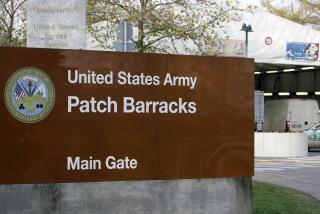Ongoing IRA Threats Disrupt Britain Transit
- Share via
Europe
Britain: A four-week series of bombs and bomb threats interrupted rail and automobile travel across much of England, culminating in a massive disruption of travel around London. The current series of bombings, attributed to the Irish Republican Army, began late last month with attacks on rail lines that halted trains in northern England. There was also a 24-hour shutdown of the major M-1 north-south highway and the closure of other roads.
Then, last Monday, new bomb threats cast London into gridlock, closing five railway stations and three main airports.
Italy and Germany: Italian police found an unexploded World War II hand grenade near the tourist-heavy Ponte Vecchio Bridge in Florence as Italian media reported a warning by military intelligence that Islamic terrorists may be planning attacks on targets in Italy, including international airports. The U.S. State Department did not confirm the report but urged Americans to use caution in Italy, particularly in Rome, Milan and Naples. Meanwhile, Germany’s foreign minister, responding to threats by a radical Islamic group in Iran to unleash suicide attacks against Germany, said the threats were being taken seriously.
Mideast
Israel: Easter Weekend observances in Jerusalem were subdued as a result of Israeli-Palestinian tension and the terrorist bombing of a Tel Aviv restaurant a week earlier that killed four people. The U.S. Embassy in Tel Aviv reminded Americans that the potential for violence remains high in Israel, the Gaza Strip and the West Bank.
South Pacific
Papua New Guinea: The U.S. State Department last month issued a short-lived warning to Americans against nonessential travel to Papua New Guinea because of threats against foreigners by insurgents in the island province of Bougainville. Americans in Bougainville were urged to leave immediately. Two days after the announcement, political unrest stemming from the uprising turned violent in Port Moresby, the capital. Police fought with protesters, and gangs looted shops. On April 4, the department lifted the travel warning.
Asia
Vietnam: A court in Hanoi sentenced a Canadian woman to death and her Vietnamese mother to life in prison for heroin trafficking. The two were reportedly arrested while trying to smuggle 12 pounds of heroin out of the country. Under Vietnamese law, trafficking in as little as 2.2 pounds of heroin is punishable by death. In southern Vietnam, a state-controlled newspaper reported a new crackdown on drug abuse, prostitution and other “social evils” in Ho Chi Minh City.
Briefly . . .
Venezuela: Citing passengers’ dissatisfaction with pollution, traffic jams and petty theft, Holland America Line announced that it has stopped making port calls in Caracas. . . . China: The nation that has the world’s highest number of smokers will ban smoking on public transportation beginning May 1, the China Daily reported. . . . Latin America: Colombia has the highest murder rate in Latin America, followed by Jamaica and Brazil, according to a report by the World Bank. Colombia’s annual murder rate at the start of the 1990s was 89.5 per 100,000 people. Lowest rates in the region were in Chile, Paraguay, Costa Rica, Uruguay and Argentina. . . . Cambodia: A dozen people were killed and more than 100 wounded, including an American, in a grenade attack on a demonstration led by an opposition politician in Phnom Penh, the capital.
Hot spots: State Department travel warnings are in effect for Afghanistan, Albania, Algeria, Angola, Bosnia-Herzegovina, Burundi, Central African Republic, Colombia, Iran, Iraq, Lebanon, Liberia, Libya, Nigeria, Rwanda, Sierra Leone, Somalia, Sudan, Tajikistan and Zaire.
The U.S. State Department offers recorded travel warnings and advisories at (202) 647-5225; the fax line is (202) 647-3000.
More to Read
Sign up for Essential California
The most important California stories and recommendations in your inbox every morning.
You may occasionally receive promotional content from the Los Angeles Times.













